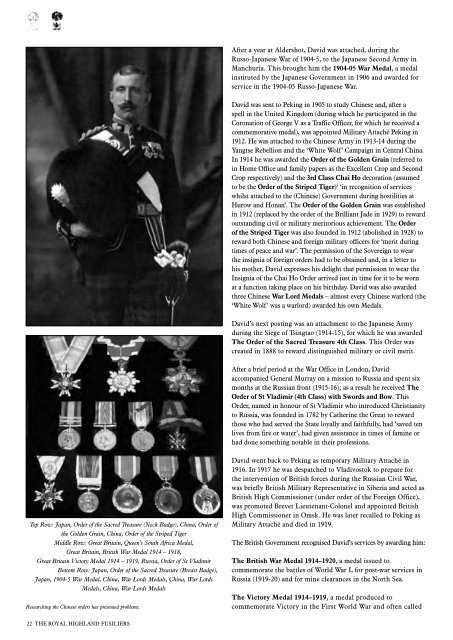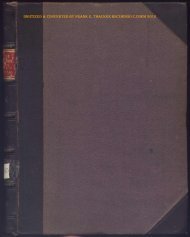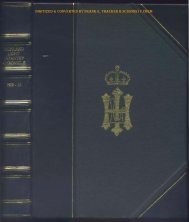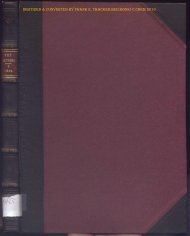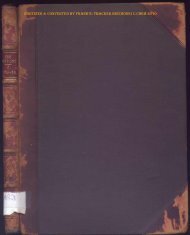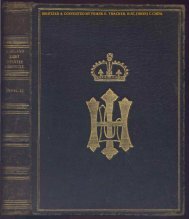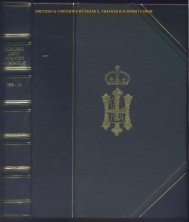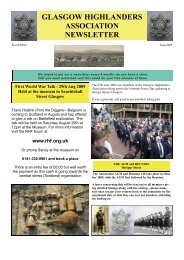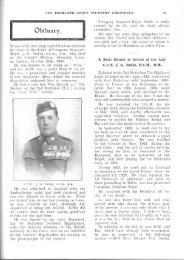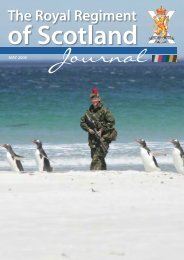Regimental MiscellanyREGIMENTAL DINNER AND LUNCHEONBoth took place this year in London in <strong>The</strong> CaledonianClub, the Dinner on the 27th of September, the Luncheonon the 28th. It was unfortunate that no Officer of theBattalion was present at either – but that’s soldiering for you.(We only hope that digging in on Luneburg Heath (or whereverone digs in nowadays in what used to be BAOR) wasn’t toorain-soddenly undesirable.) But there were three members of theBattalion there at the Dinner – and how they made their presencefelt! Pipe Major Roderick Weir was one, LCpl S Gillies another,and LCpl A Gordon the third of that notable trio.It was a ‘trio’ – and yet the pipes were so beautifully tuned itwas only the reduced volume that let us know when they weren’tplaying in concert. <strong>The</strong>y played in particular <strong>The</strong> 71st Quickstepwith such beauty that even the subsequent 74th Slow March paledinto insignificance! But we mustn’t forget the Pibroch. This,played of course by the Pipe Major, was <strong>The</strong> Groat, a piece quiteunknown to our unmusical ear. How perfect it was to hear! (Wetook counsel with LCpls Gillies and Gordon and were happy tohear that even that redoubtable pair of experts in the Good/Great<strong>Highland</strong> Music agreed with our untutored ear. Pipe MajorRoderick Weir can cheerfully take his place among the Greats!)But that was not all the greatness. We had with us OUR OWNCOLONEL! Major General Euan Loudon may no longer beColonel Commandant of <strong>The</strong> <strong>Royal</strong> Regiment of Scotland (in shorthand:SCOTS – without the superfluous ‘<strong>Royal</strong>’) and is now solely‘<strong>The</strong> Representative Colonel of <strong>The</strong> <strong>Royal</strong> <strong>Highland</strong> <strong>Fusiliers</strong>’.As such he spoke of the Battalion’s future. Would it be Iraq or elsewherein the Spring? If Iraq is off, somewhere else is on. (It is. <strong>The</strong> Battalion is offto Afghanistan in March <strong>2008</strong>.) And recruiting! We’re not only somewhatahead of our immediate competitors but we also win on retention. Oursoldiers like being <strong>Royal</strong> <strong>Highland</strong> <strong>Fusiliers</strong>. Not only do many of themstay the course but more of them stick it than some others do.He also spoke of the past, of the notable Service conducted by theReverend Dr Laurence Whitley in Glasgow Cathedral this yearto remember the Somme. (<strong>The</strong>re is a report of this on page 23.)More presently, he spoke of our Benevolent Society conducted byKen Kenyon and, of course, of HHQ conducted by Colonel Steele.Even <strong>The</strong> <strong>Journal</strong> was mentioned!<strong>The</strong>n came the future – other than whatever else “is on” forthe Battalion. Next year (<strong>2008</strong>) there is to be an RHF Dinnerin Glasgow’s City Chambers – and the next (2009) will see apresentation of a new Assaye Colour.Oh dear, that’s all we can decipher from our scribbled notes.<strong>The</strong>re must have been lots more.Next day was the Luncheon. No speeches – but lots of ladies. Itwas unfortunate that General Stuart Green couldn’t make it (wehear that he is very ill) – and nor, of course, could Mrs Green.In fact, there wasn’t a great deal of us there. But Dick BromleyGardner was. We were, as ever, more than amused.Nor did we mind the red wine (an unobserved claret) beingserved first. Why should we (or why should most of us be)?Most of our palates are untutored. (Sandy Ingram used to say, atthe Maryhill Depot in 1958, “Red wine rots gentlemen’s guts!”– despite there then being in the Mess Cellar bottle upon bottleof Pre-War Clarets, each of a notable Vintage. How particularlyuntutored we were then!)But, despite our (no doubt ignorant) semi-criticism of the winesequence,we must applaud <strong>The</strong> Caledonian Club. <strong>The</strong> food wasas good as we have ever eaten and the service was remarkablyimmediate. <strong>The</strong> Club did us well.But someone remarked (despite his lack of Latin), “Quis custodietcustodes ipsos?” Oh dear, not only might our Latin be a bit inaccuratebut its relevance has escaped us. (Can we look forward to a vigorouscorrespondence – to be published in the 2009 Edition?)Incidentally, Pipe Major Weir played even more recently in ourearshot. <strong>The</strong> occasion was Donald Mack’s funeral where, despite thepouring rain, the Pipe Major played a fine succession of CompanyMarches at the entrance to Hyndland Parish Church (Donald havingcommanded all of the Companies other than FSp Coy), and then later,at the Clydebank Crematorium, he played <strong>The</strong> Regimental Lament.At the latter, ‘<strong>The</strong> Good <strong>Highland</strong> Music’ was even brieflysurpassed(?). Fusilier Christopher Crawford (Mackenzie-trewedand sharply-spatted) blew Last Post and then Reveille. We havenever heard a finer Last Post. Convinced that its excellence musthave come from an orchestral key-trumpet, we inquired. Beneathhis (luckily) all-enveloping Gortex cape, Fusilier Crawford had nomore than an issue bugle slung!Lt Col David Stephen Robertson OBE <strong>Royal</strong>Scots <strong>Fusiliers</strong> (1874-1919)Lieutenant-Colonel David Stephen Robertson OBE (1874–1919) wasa brilliant linguist – he spoke French, Chinese, Russian, Japaneseand Serbo-Croat fluently – and for much of his career worked insemi-diplomatic/intelligence posts in areas of conflict in the FarEast and Russia. His medals (shown below) reflect his fascinatinglife and, with their intriguing names and exotic designs, provide awonderful glimpse of the cultures in which he worked.David was the son of David Robertson J.P. of the Glasgowpublishing firm, Robertson & Co. David senior was active inthe then newly-formed Clan Donnachaidh Society and in 1894organised a dinner attended by Alasdair Stewart Robertson ofStruan, the 20th Chief.Young David joined the <strong>Royal</strong> Scots <strong>Fusiliers</strong> in 1897. He served withhis Regiment in India and then in the Boer War in South Africa. Hewas promoted to the rank of Captain at this time and received his firstmedal, the Queen’s South Africa Medal 1899-1902. This Medal, withbars to indicate the campaigns in which the individual fought, wasawarded to British and Colonial Forces who took part in the Boer Warand to civilians employed in official capacities.THE ROYAL HIGHLAND FUSILIERS 21
After a year at Aldershot, David was attached, during theRusso-Japanese War of 1904-5, to the Japanese Second Army inManchuria. This brought him the 1904-05 War Medal, a medalinstituted by the Japanese Government in 1906 and awarded forservice in the 1904-05 Russo-Japanese War.David was sent to Peking in 1905 to study Chinese and, after aspell in the United Kingdom (during which he participated in theCoronation of George V as a Traffic Officer, for which he received acommemorative medal), was appointed Military Attaché Peking in1912. He was attached to the Chinese Army in 1913-14 during theYangtse Rebellion and the ‘White Wolf’ Campaign in Central China.In 1914 he was awarded the Order of the Golden Grain (referred toin Home Office and family papers as the Excellent Crop and SecondCrop respectively) and the 3rd Class Chai Ho decoration (assumedto be the Order of the Striped Tiger) 1 ‘in recognition of serviceswhilst attached to the (Chinese) Government during hostilities atHurow and Honan’. <strong>The</strong> Order of the Golden Grain was establishedin 1912 (replaced by the order of the Brilliant Jade in 1929) to rewardoutstanding civil or military meritorious achievement. <strong>The</strong> Orderof the Striped Tiger was also founded in 1912 (abolished in 1928) toreward both Chinese and foreign military officers for ‘merit duringtimes of peace and war’. <strong>The</strong> permission of the Sovereign to wearthe insignia of foreign orders had to be obtained and, in a letter tohis mother, David expresses his delight that permission to wear theInsignia of the Chai Ho Order arrived just in time for it to be wornat a function taking place on his birthday. David was also awardedthree Chinese War Lord Medals – almost every Chinese warlord (the‘White Wolf’ was a warlord) awarded his own Medals.David’s next posting was an attachment to the Japanese Armyduring the Siege of Tsingtao (1914-15), for which he was awarded<strong>The</strong> Order of the Sacred Treasure 4th Class. This Order wascreated in 1888 to reward distinguished military or civil merit.After a brief period at the War Office in London, Davidaccompanied General Murray on a mission to Russia and spent sixmonths at the Russian front (1915-16); as a result he received <strong>The</strong>Order of St Vladimir (4th Class) with Swords and Bow. ThisOrder, named in honour of St Vladimir who introduced Christianityto Russia, was founded in 1782 by Catherine the Great to rewardthose who had served the State loyally and faithfully, had ‘saved tenlives from fire or water’, had given assistance in times of famine orhad done something notable in their professions.Top Row: Japan, Order of the Sacred Treasure (Neck Badge), China, Order ofthe Golden Grain, China, Order of the Striped TigerMiddle Row: Great Britain, Queen’s South Africa Medal,Great Britain, British War Medal 1914 – 1918,Great Britain Victory Medal 1914 – 1919, Russia, Order of St VladimirBottom Row: Japan, Order of the Sacred Treasure (Breast Badge),Japan, 1904-5 War Medal, China, War Lords Medals, China, War LordsMedals, China, War Lords MedalsResearching the Chinese orders has presented problems.David went back to Peking as temporary Military Attaché in1916. In 1917 he was despatched to Vladivostok to prepare forthe intervention of British forces during the Russian Civil War,was briefly British Military Representative in Siberia and acted asBritish High Commissioner (under order of the Foreign Office),was promoted Brevet Lieutenant-Colonel and appointed BritishHigh Commissioner in Omsk. He was later recalled to Peking asMilitary Attaché and died in 1919.<strong>The</strong> British Government recognised David’s services by awarding him:<strong>The</strong> British War Medal 1914–1920, a medal issued tocommemorate the battles of World War I, for post-war services inRussia (1919-20) and for mine clearances in the North Sea.<strong>The</strong> Victory Medal 1914–1919, a medal produced tocommemorate Victory in the First World War and often called22 THE ROYAL HIGHLAND FUSILIERS


